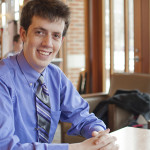After winning a $3.8 million grant from the National Science Foundations for the next five years, researchers across several departments of Case Western Reserve University will collaborate with scientists from seven other schools to try to take some of the irony out of sustainability.
“We want to make sustainability sustainable,” said Dr. Manas-Zloczower, a professor of macromolecular science and engineering and the head investigator of the project.
“The current sustainability we have only consists of replacing oil with wind or solar energy. To harvest those energies, though, the creation of the structures is not truly sustainable.”
Many of the materials used to construct wind turbines and solar panels are currently petroleum-based; the goal of this research is to not only improve the function and lifespan of the current materials, but also to eventually replace those materials with materials created from biomaterials.
Research at CWRU will consist of two primary aspects in which a team led by Manas-Zloczower will examine the effects of fillers on material structural strength and toughness and researchers led by co-investigator and physics professor Ken Singer will study materials used in solar cells.
Manas-Zloczower’s research looks to improve on wind turbine blade design. First, Manas-Zloczower will examine the effects of adding modified carbon fiber nanotubes to existing resins, with cellulose whiskers eventually replacing the carbon nanotubes later.
A biomaterial, the cellulose needed for cellulose whiskers can be obtained from several sources, most commonly shells. Cellulose whiskers are a natural nanofiller, allowing them to improve the strength of the composite.
If the whiskers are a success, then Manas-Zloczower will attempt to create a resin completely out of biomaterials.
While Manas-Zloczower focus has large implications in the world of wind power, Singer’s efforts hope to impact the field of solar energy. Singer will use liquid crystals derived from living things, as opposed to synthetic crystals, as semiconductors to create large area electronic devices “easily” for a “relatively low cost,” he said.
“A lot of people are looking at polymers as a new class of photovoltaic materials,” Singer said, “but the interesting thing about liquid crystals is that they self-assemble, which is kind of like how living beings develop. So it’s kind of an interesting process for making essentially devices from the molecule up.”
Singer describes the liquid crystal at a molecular level as a “poker chip” with “fuzz around it”. The “fuzz” directs the assembly and causes the molecule to “stack” like “poker chips”. The resulting molecule is not a crystal, but does have order to it, making it a better semiconductor.
Singer says that his team will look at two different types of “fuzz”, a lipid and a polypeptide, around the molecule. Singer notes that polypeptides are difficult and expensive to synthesize, but are “very abundant” in nature.
According to Singer, the research is not only important in terms of energy, but will have potential applications “far beyond energy” if it works out.
“If you work at both the wind and solar project, underneath all that, we’re trying to open up a new research front where you use biological material in high technology applications,” Singer said.
Research is not the only focus of this grant, however. The program also funds three two-week summer classes focusing on sustainability that will be offered in the coming years. The first class is set to begin this summer. According to Manas-Zloczower, these courses seek “to teach interest in sustainability”.
“We hope that we will extend the program and the impact of the program beyond the people strictly involved in research,” Manas-Zloczower said.
The first course is set to focus on quantitative sustainability and will be taught by Dr. J. Iwan Alexander, the faculty director of the Great Lakes Energy Institute.
According to Manas-Zloczower, the program will feature an “extensive” student exchange program between the eight universities involved. Beyond CWRU, Polytechnic Institute of New York University, the University of Pennsylvania, Rochester Institute of Technology, the University of Sheffield in the United Kingdom, the University of MONS in Belgium, the University of Bologna in Italy, and Santa Catarina State University in Brazil will participate in the program as well.


